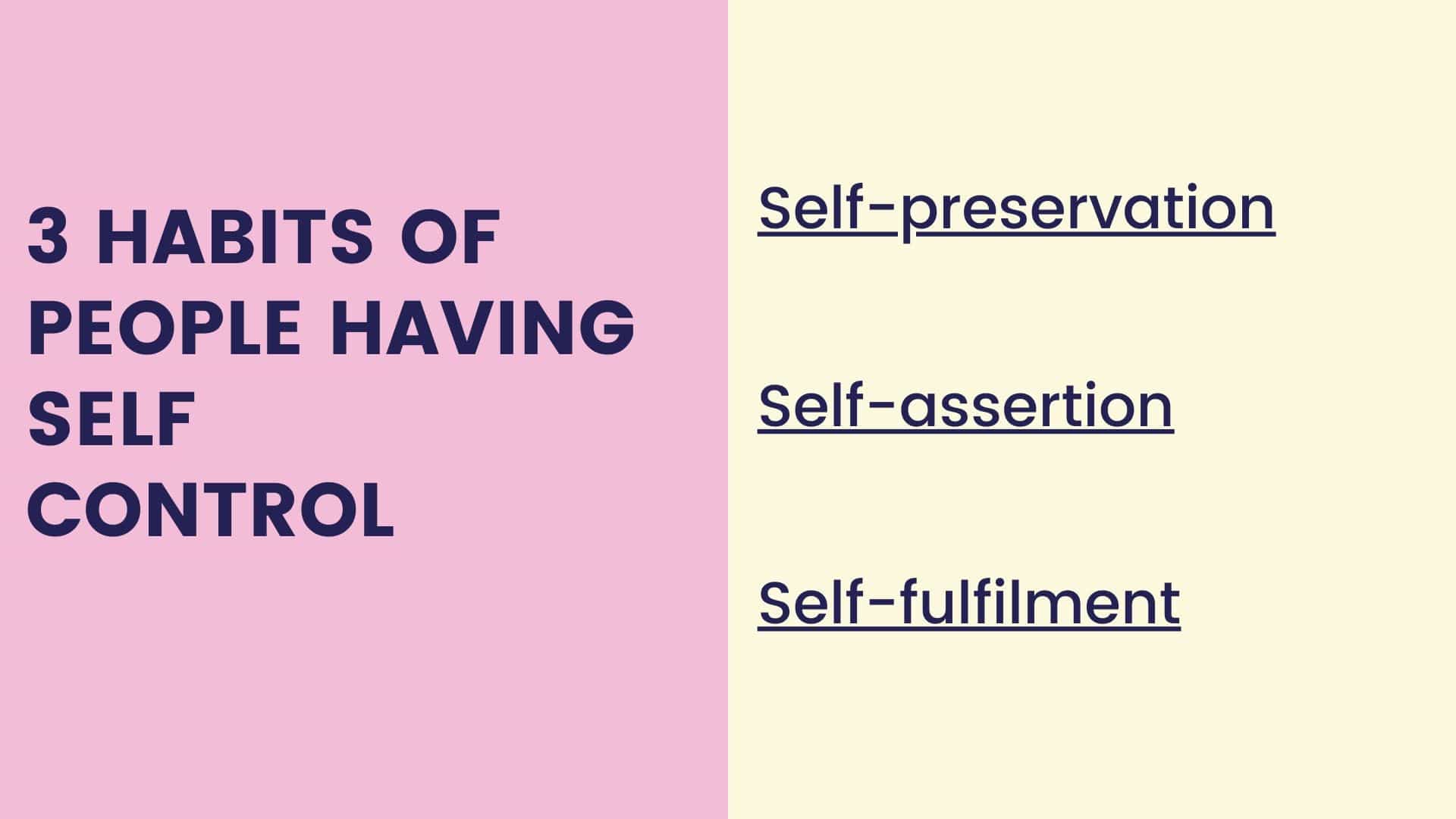
What are the Different Types of Self-Control? A Comprehensive Guide

Self-control is the art of regulating one's thoughts, emotions, and actions to resist temptations and impulsive situations It's an essential skill that allows individuals to make sound decisions and achieve their goals
The capacity for self-control means being able to manage and direct your emotions, thoughts, and behaviors when faced with impulsive or tempting circumstances. It empowers you to resist the urge to engage in actions that are not beneficial or in your best interest.
Mastering oneself is perhaps the greatest obstacle one will encounter in life. Yet, if you can develop and maintain self-control, you will possess the ability to conquer any challenge. This is precisely why James Allen, a renowned British philosopher, famously stated, "Self control is strength. Right thought is mastery. Calmness is power."
In this article, we will take you into the world of Self-control to help you learn what it is and how you can master the Self-controlling skills.
What is Self control?
Self control is the proficiency of a person to control herself/himself.
It’s about having control over their desires, emotions, appetite, or temper.
Someone who possesses the ability to regulate their impulses and focus based on their own volition is considered to be a master of self-control. Self-control can be instrumental in enabling an individual to function effectively within a structured management system.
Studies have demonstrated that exhibiting self-control can have a positive impact on an individual's overall health and well-being. This can manifest in various ways, such as improved eating habits, regular exercise, avoiding procrastination, saving money, or breaking free from harmful addictions.
Having strong willpower is essential in achieving your goals, as it helps you avoid temptation and distractions. Self control involves delaying gratification and managing unwanted emotions, which requires controlling habits, behavior, and emotions.
Unnecessary urges or distractions should be avoided at all costs. For instance, smoking is an addictive behavior that serves no purpose but to harm one's health and deplete their finances. Quitting such a habit requires a great deal of self-control.
Having self-control is crucial when it comes to achieving success. According to Jan McKinley Hilado, self-control plays a significant role in this process. She emphasizes that although we can't control everything in life, we have the power to control ourselves.
So, all in all, Self-control is very crucial for driving us towards success. In the next section, we will talk about the importance of Self-control-
Importance of Self control
To achieve your goals, it is essential to exercise self-control. In a world filled with distractions, it is easy to lose focus and veer off course. By recognizing these potential distractions and actively avoiding them, you can maintain control over your actions and decisions. It takes discipline and a willingness to prioritize your goals over short-term gratification, but with self-control, you can reach your objectives.
Having self control not only aids in academic success, but also in personal life. Maintaining control over one's weight and exercise routine requires a significant amount of self control, which is crucial in achieving goals and improving overall health. In fact, self control may be even more important than IQ and is closely linked with emotional intelligence. Whether aiming to break a bad habit or reach a specific target, self control is a necessary and advantageous attribute to possess.
3 Habits of people having Self Control
Individuals who have Self-control incorporate the following habits-
1. Self-preservation
People who possess self-control have developed the practice of prioritizing their needs over their wants, leading them to adopt a healthy mindset. They value self-preservation, which allows them to enhance and strengthen their lives without succumbing to excessive indulgence in superfluous things.
2. Self-assertion
Individuals who exercise self-control possess the ability to assert themselves and maintain a sense of comfort in their thoughts and beliefs. This trait also aids in their ability to remain composed while expressing their opinions.
Those with self-assertion skills are confident in speaking their minds, while also allowing space for others to share their perspectives. As a result, individuals with this trait are able to express their thoughts with conviction, while also being considerate of others.
3. Self-fulfillment
Self-fulfillment is crucial for everyone, including those with disabilities. To achieve self-fulfillment, one must possess resilience and perseverance. It enables individuals to uncover their true passions and capabilities. Self-fulfillment is linked to the realization of one's aspirations and dreams.
5 Ways to improve Self control
It has been proven through research that there are numerous techniques available to achieve self-control. This includes breaking unwanted habits or behaviors and developing effective patterns through practice.
In order to cultivate self-control in your behavior, it is crucial to look inward for guidance. Don't allow the opinions and words of others to sway you, but instead stay attuned to your own innermost desires, ambitions, and goals.
To develop mastery over this important skill, there are several key tips to keep in mind. We've outlined some helpful strategies below to help you improve your self-control. Let's dive in.
1. Start practicing
All of us are aware of the saying, “Practice makes a man perfect.”
Consistency is key, especially for those who are dedicated to exercising or weight loss. It is crucial to make a commitment to what works for you and disregard what does not serve a purpose.
Quitting smoking can be challenging, but it is a necessary step towards a healthier life. Instead of wasting time and money on this harmful habit, invest in activities and habits that will improve your well-being and bring you long-term benefits. Remember, taking care of yourself is always worth it.
1. Start practicing
Avoid unnecessary desires and confusion by focusing on what is truly necessary. While practice is beneficial, avoidance is even more important. If you find yourself addicted to anything detrimental to your health and well-being, it is crucial to steer clear of it.
If there is someone or something causing you distress, it is important to distance yourself from it. Even if you have strong feelings for someone who treats you poorly, it is important to prioritize your own well-being and avoid them. Don't sacrifice your self-respect for the sake of love. Focus on finding peace of mind instead.
2. Avoid temptation
Deciding too many things at once can only create confusion, and that is why you should also avoid this ineffective approach, set one goal at a time.
Stay committed to your goals and prioritize them accordingly. It is crucial to avoid creating a long list of New Year's resolutions that may become overwhelming and result in unfulfilled promises. Instead, tackle one goal at a time and stay focused on achieving it. Once you have accomplished that goal, move on to the next one. By doing so, you will build self-discipline and be more consistent in your efforts.
Focus is highly essential in letting us have Self control. While talking about the importance of focus, Bruce Lee once said-
“The successful warrior is the average man, with laser-like focus.”
So, the focus is that one factor which, when combines with Self control, turn right into great.
3. Focus on your goal
Create a detailed plan outlining the steps you will take to achieve your goal, and make sure to prioritize self-control in areas such as your health and eating habits. If you find yourself tempted by unwanted desires, resist them and stay focused on your plan.
Effective planning is crucial, but it's not about over-planning. It involves intentional efforts to enhance or regulate a particular aspect.
Achieving self-control requires a conscious decision to adhere to necessary actions rather than giving in to impulsive desires.
4. Start planning
The ability to delay gratification is a crucial skill that involves resisting the urge to obtain immediate satisfaction. Practicing this skill can help improve one's self-control abilities.
"Self-discipline is the ability to make yourself do what you should do, when you should do it, whether you feel like it or not." This statement perfectly encapsulates the essence of delaying short term desires in favor of long term rewards. By exercising self-control in this way, individuals are able to reap greater benefits and achieve their goals more efficiently. It is a valuable skill that can be developed and honed over time, leading to greater success and personal fulfillment.
Disciplining oneself to postpone immediate satisfaction in order to reap greater rewards in the future is an essential requirement for achieving success. With that said, there are several effective methods for cultivating self-control. Now, let's explore how you can manage your actions to become more self-controlled.
Here is a video byon Self Control.
Motivation and monitoring are significant to regulate your behavior.
For Self control, it is vital to stay motivated and alert on what you should do and avoid respectively.
A person to regulate his behavior should focus on certain things to improve.
Lack of willpower or any other thing that is required should be fulfilled.
Having motivation is crucial as it serves as a driving force towards achieving your objectives. However, it is equally important to exercise control over your actions in order to attain your desired outcomes. In addition to self-control, self-esteem also plays a significant role in accomplishing long-term goals.
It is better to control one’s behavior and habit by practicing what should be avoided. Once the behavior is regulated, the person becomes consistent.
Final Thoughts about Self Control
Developing self-control is a learned skill that requires practice and effort. It is not something that people are born with, but rather something that successful individuals cultivate over time. Self-control is a key factor in achieving success, whether it is in managing eating habits or finding the right balance to improve one's life.
Finding the right balance is key to exercising self-control, rather than complete abstinence. When following a diet, it is not necessary to completely give up foods you love. Instead, allowing for a cheat day once a month can help maintain balance. By mastering the art of balance, you can effectively exercise self-control.
In order to achieve success in life, it's crucial to integrate self-control into all aspects of your life including daily habits, attitude, character, actions, and emotions. With the ability to do what needs to be done, self-control will enable you to perform like a pro and achieve your goals. We hope these tips will inspire you to exercise self-control in all areas of your life.
What according to you, is the essential tip for Self-control?
How important do you consider Self-controlling for being successful in today’s time?
Share your views with us in the comments below.
















